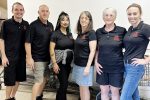Volunteers needed to fight child abuse
By LPR Staff
Editor/POST-REGISTER
All too often, shocking headlines make their way into local and national news about children facing the nightmare life of abuse, neglect and poverty. More and more, those children are revealed to have been products of a generational system of abuse and neglect, and almost unfailingly, teachers, neighbors, friends and ou
tside observers are left asking the same questions: “How could this happen, and why didn’t someone try to stop it?”
Last year alone in Caldwell County, more than 520 reports were made of possible abuse or neglect. More than 100 of those were removed from their homes and placed into the custody of the State. No longer simply children of abuse or neglect, 107 Caldwell County youngsters last year became “ children of the system.”
More than anything, the “children of the system” need a voice. They need a safe harbor in the storm, and they need someone to put their interests first.
CASA (Court Appointed Special Advocates) of Central Texas provides that voice – or at least, they try.
“CASA volunteers are appointed by the judge as a ‘guardian at law’ for children in CPS care,” said Eloise Hudson, Community Relations Coordinator for CASA of Central Texas. “They aren’t custodial guardians, so they don’t have to take their children in, or provide food or clothing for them. But what they are granted access to school and medical records, the court records… they can talk to the teachers and the lawyers and the children and the doctors. It’s their job to find out what’s going on in the home, or at school, and help make the decisions about what’s best for those children.”
Of the 107 children in state care last year, only 28 had CASA advocates. The lack of volunteers in the community, Hudson said, creates a lack of ability to provide services.
“What we’d love to be able to do is to be able to have a CASA for every case,” she said. “Our CASAs are a point-of-contact, not only for the children but for the adults involved in that child’s life, and they help make the decisions about not only the big things, like whether the child should be returned to the home, but the small things, like whether the Judge should order therapy for the child, or whether the child should be involved in special education classes.”
After a 40-hour training period, CASA advocates are generally asked to handle one case, and asked to commit to that case for at least one year.
“Of course, it takes time to develop trust with the children, if they’re old enough for that,” Hudson said. “And sometimes these cases stretch on and on. They are reviewed by the Judge every three months, and for those court dates, we ask our advocates not only to write a report to the court, but we do ask them to be present to testify.”
Those commitments, more than any others, Hudson said, seem to be the factors that prevent people from volunteering.
“People are nervous about appearing in court, and we understand that,” she said. “But what a lot of people don’t know, starting out, is that they don’t have to be an expert in child welfare, and they don’t have to be a lawyer. We have staff members here at CASA that supervise the advocates, and are here to offer advice and to help them with those questions. What we need in our advocates, more than anything, is just that they care about kids and they want to help. All of the more complicated issues, all of the legal questions, that’s what the staff is here to help them navigate.”
Lockhart resident Rosa Hernandez has been a CASA volunteer for more than 13 years.
“When I found out about the CASA program, I got trained and volunteered as soon as I could,” Hernandez said. “I got my first case the day I finished my training, on Oct. 14, 1997.”
Hernandez said that she was led to volunteer because of her own childhood, which she describes as almost idyllic.
“We were happy, and our parents loved us,” she said. “There were five of us, and if we ever wanted for anything, I don’t know what it was. Our parents taught us discipline, and sometimes we were spanked, but when that happened, it was because we deserved it, and it didn’t happen often.”
She said that when she moved to Lockhart with her family in the 1990s, she noticed that several of her daughters’ friends were experiencing childhoods quite different than hers, and than the experience she was trying to provide for her daughter.
“They would come to me sometimes, and they were just being abused, or yelled at or called names,” she said. “And they thought that was just normal, that was the way families were. I tried to show them then that it could be another way – that it was supposed to be another way.”
She tries to give the same message to her “CASA kids.”
“Kids are supposed to be kids,” she said. “They aren’t supposed to be worried about where their next meal is going to come from, or whether they’re going to be beaten or who’s going to come home in what kind of mood. They are supposed to be able to laugh and play, and to be encouraged and loved.”
Hernandez said her chief goal, with each of her “CASA kids” – more than a dozen over the years – is to remind them that the abuse or neglect is not their fault, and that they can overcome it, if they want to.
“A lot of times, they grew up this way, and their parents grew up this way, and it’s the only thing the families know,” she said. “So I don’t just work with the kids and encourage them and try to help. I also work with their parents, try to help their parents sometimes find work or help for their addiction or a better place to live, or whatever it is. Because what I always want to see is the kids put back in the home – as long as the home is going to be the best place for the kids.”
Although she said that she has been threatened once or twice over the years by parents of her CASA appointees, she wouldn’t consider stopping the work.
“They think that I actually work for CPS, and so sometimes, they really hate me,” she said. “And I’ve had one call and threaten me, and I knew who that was so of course I called law enforcement. Sometimes they give me ugly looks on the street and things like that, but some of them also understand that I don’t want to help the State take their kids away. I don’t want to keep the kids out of the home. All I want is to help the kids, and to make them safe. That’s the only job I have, is to make sure that those kids are safe.”
Hernandez said that she generally gives a few hours a week, usually averaging about 15 or 20 hours per month to her “CASA kids,” but that she has, on occasion, gone above and beyond for them.
“One of my kids, I was trying to find a family member for her to live with, so that she didn’t have to go into a foster home with strangers, or a residential facility,” she said. “And I found an aunt [out of state] that said she thought that she could take her, and might even want to adopt her. So, maybe I wasn’t really supposed to, but I went with her and her CPS caseworker up there, and took her to live with her aunt.”
Some time later, Hernandez said, that child was adopted by the aunt, who eventually moved back to Texas.
Some people may not have the time or the comfort level to devote to face-to-face advocacy with the children, Hudson said. That doesn’t mean there aren’t plenty of volunteer opportunities for those individuals, as well.
“We also have a very active board of directors, who – although they don’t work directly with the children – oversee our operations and the direction of the organization,” she said “And currently, we only have one director from Caldwell County, so we need more directors, as well.”
The directors, she said, are charged with reviewing the success and the needs of the program, and are often the voices that speak out when more professional caseworkers, additional training or other cooperative efforts are needed.
“It’s not the same kind of commitment of time and emotion that the advocates are asked to put in,” Hudson said. “But it’s just as important. Our directors are the people on the ground in the community, they are the ones that are connected with the people, the schools, and the services in each community, so they know what’s out there and they know where to turn when we need help.”
At any level, Hudson said, the greatest need CASA has annually is for volunteers.
“We were only able to serve a fraction of the children in Caldwell County that need our help last year,” she said. “And Caldwell County is our lowest-served county, because we have the fewest volunteers there.”
Every volunteer, she said, is another voice in the fight.
And it’s a fight that needs fighting.
CASA of Central Texas will host a free information session to discuss how the agency is advocating for local abused and neglected children, and how members of the community can make a difference, too. The meeting is scheduled on Wednesday, July 20, from 7-8 p.m. at the First Christian Church of Luling, 712 E. Crocket St.
The one-hour information session will introduce the public to the non-profit child advocacy agency, and share ways community members can join the fight against child abuse.
For more information or to RSVP, please contact Vera Cruz at vcruz@casacentex.org or (830) 626-2272. To learn more about CASA of Central Texas, please visit www.casacentex.org.




